Founded in 1916, the National Cooperative Business Association CLUSA International (NCBA CLUSA) is the oldest not-for-profit cooperative development and trade association in the United States, established with the mission to develop, advance and protect cooperative enterprise. In 15 countries throughout Africa, Asia and Central America, NCBA CLUSA has designed and implemented development programs for a wide range of donors for more than 65 years. NCBA CLUSA has been active in Mozambique since 1995. We began our work at a time when the country’s infrastructure was still devastated after 17 years of civil war and market access was one of smallholder farmers’ main challenges. Our initial activities therefore focused on the development of producer organizations to empower smallholders and increase their access to input and output markets. We consolidated these efforts by improving the enabling environment so that farmer groups could thrive both socially and financially—for instance, supporting them to become legal associations and, later, modern, dynamic and for-profit cooperatives legalized under Mozambique’s new cooperative law, which came into effect (though ours and our partners’ advocacy efforts) in 2010.
 Today, NCBA CLUSA continues to help Mozambican farmers thrive. As conditions in the country evolve, so does our work. While rural infrastructure and smallholder market access have greatly improved, Mozambique in 2021 faces new challenges including a growing population to feed—compounded by the increased prevalence and severity of climate-related natural disasters—a violent insurgency growing in intensity and, more recently, the acute challenges presented by a global pandemic. In this context, our work has taken on a more resilience and food security focus that promotes farmers’ and rural entrepreneurs’ production, incomes and livelihoods through sustainable, market-driven and local systems-based interventions. These include the promotion of conservation farming as a more sustainable method of production designed to withstand ever-worsening climate shocks, the adoption of risk sharing mechanisms such as weather index insurance, and inclusive business approaches—such as last-mile agrodealer networks and outgrower programs—that embed farmers and micro entrepreneurs in agricultural firms’ business models.
Today, NCBA CLUSA continues to help Mozambican farmers thrive. As conditions in the country evolve, so does our work. While rural infrastructure and smallholder market access have greatly improved, Mozambique in 2021 faces new challenges including a growing population to feed—compounded by the increased prevalence and severity of climate-related natural disasters—a violent insurgency growing in intensity and, more recently, the acute challenges presented by a global pandemic. In this context, our work has taken on a more resilience and food security focus that promotes farmers’ and rural entrepreneurs’ production, incomes and livelihoods through sustainable, market-driven and local systems-based interventions. These include the promotion of conservation farming as a more sustainable method of production designed to withstand ever-worsening climate shocks, the adoption of risk sharing mechanisms such as weather index insurance, and inclusive business approaches—such as last-mile agrodealer networks and outgrower programs—that embed farmers and micro entrepreneurs in agricultural firms’ business models.
Over the past 26 years, NCBA CLUSA Mozambique has managed programs funded by U.S. Agency for International Development (USAID), the Government of Mozambique (GOM), International Fund for Agriculture Development (IFAD), the Bill and Melinda Gates Foundation, the Norwegian Embassy in Maputo, the Swiss Cooperation, the Government of the Netherlands and others. Divided into two sections, this short overview tells the big story of NCBA CLUSA’s past and present work in Mozambique.
Our Past
1995-2009 – Manica, Tete, Zambézia and Nampula
We supported thousands of farmers to organize themselves into formal groups
To increase their access to inputs and off-take market and take advantage of economies of scale, we supported thousands of farmers to organize themselves into associations, forums, unions, cooperatives, youth farmers’ clubs and credit and savings groups. In 2003, together with Gapi SI and Oxfam Novib, we supported 554 of the strongest farmers in Nampula province to form their own producer owned trading company, Ikuru sarl, whose owners were its own producer suppliers owning a 10 percent share of the company. With funds from two USAID Global Development Alliances between 2007 and 2012, we helped Ikuru to buy, process and sell around 1,500 tons of its members’ produce, generating USD$1.5 million.
2003-2010 – Manica, Zambézia, Nampula and Niassa
We advocated for and helped develop an enabling environment for modern cooperatives
To create the necessary legal framework profit-driven farmer enterprises need to flourish, we supported civil society actors to improve the legal environment in Mozambique, culminating in the passage of a new association law by the country’s legislature in 2005. We consolidated this through the USAID-funded Cooperative Development Program (CDP), establishing the Mozambican Association for the Promotion of Modern Cooperatives (AMPCM) and advocating for the new co-op law in 2010, now one of the most modern co-op laws in the world. We supported 18 cooperatives to legalize themselves under this new law—the most notable being ALIMI in Niassa, with 13,000 members.
Our legacy continues today in the north and center of the country through local organizations dedicated to agricultural development, including the Miruku Business Cooperative, the Technical Assistance Unit for Functional Education, or UATAF (building communities’ capacity through education and social mobilization), and OLIPA-ODES (promoting socio-economic development through cooperation). These organizations were created with our institutional support and to this day continue to be led by former NCBA CLUSA staff and partners.
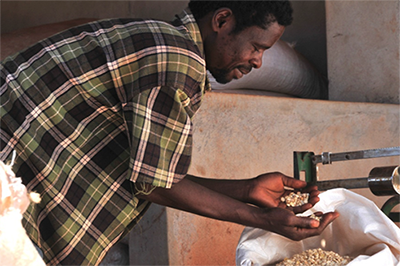 2007-2012 – Zambézia
2007-2012 – Zambézia
We kickstarted new, high-value value chains with the power to transform communities
In the 1980s, soybeans were cultivated small-scale in pockets of northeast of Zambézia province, with little success. Spurred by Norwegian interest in purchasing non-GMO soybeans from Mozambique, and with finance from the Norwegian Development Agency (NORAD), we spotted an opportunity to take advantage of soybean’s potential to generate thousands of jobs, increasing smallholder income and enabling the expansion of other strategic local industries. In 2007, our ProSoja project reintroduced soybeans in Zambézia, marking the beginning of what has been one of Mozambique’s biggest agricultural success stories in recent years. We supported more than 5,000 smallholders to make the transition from subsistence to commercial agriculture by producing soybeans—sky-rocketing production from just 500 tons to 6,000 tons per year and transforming the social and economic conditions of districts like Lioma and Ruace. Our intervention laid the foundations for an industry that today produces around 44,000 tons per year, generates income for around 38,000 soybean producers and has been essential for supporting the growth of the local poultry industry—another of the country’s major successes.
2003-2012 – Manica, Zambézia, Nampula and Niassa
We supported farmers and small and medium companies (SMEs) to add value through improved quality and processing
With funds from USAID through two Global Development Alliances, we connected Ikuru sarl with niche international markets for Fairtrade and organic certified products by supporting 4,000 of its producer-members to become certified as Fairtrade and organic for soybeans, sesame, cashew nuts and peanuts. With our technical support in packing, quality control, export logistics and marketing, Ikuru became Mozambique’s first ever exporter of Organic/Fairtrade product, exporting around 500 tons of certified product worth USD$2 million to Europe and Norway and putting Mozambican product on the shelves of two major UK supermarket chains, Sainsburys and Tesco. On top of achieving higher sales prices, Ikuru’s certified farmers earned more than USD$100,000 in Fairtrade premiums. None of this would have been possible without NCBA CLUSA’s support to establish Ikuru’s own aflatoxin testing laboratory at the University Lúrio in Nampula, the first commercial aflatoxin laboratory in the country, which ensured that all of its exports were aflatoxin free. Aflatoxin is a carcinogenic fungus that can contaminate grains and nuts. The laboratory has since not only provided commercial testing services to a range of other local producers and exporters—addressing on one of the biggest barriers to peanut exports from Mozambique—but has also contributed to the improved health of thousands of Mozambicans who unknowingly put their health at risk every day by consuming aflatoxin-contaminated foods.
2009-2012 – Manica, Zambézia and Nampula
We were one of the pioneers of the emerging farmer concept in Mozambique
With the Agrifuturo project, a USAID-funded consortium led by Abt Associates, we selected 20 smallholders with a more strategic market vision and supplied them with a tailor-made package including intensive technical assistance and mentoring, connection with inputs suppliers and local/international markets, and support in accessing production credit via Banco Terra. Our technical team introduced new varieties of sesame from Tanzania and Nicaragua, developed innovative market-based solutions for managing pests and diseases (e.g. sesame seed treatment kits and foliar feed fertilizers), and introduced processing and quality control techniques to meet exigent export standards. In the first year alone, this group of pioneering farmers cultivated 400 hectares of crops and generated more than USD$153,000 in income, spurring other farmers to join. Each emergent farmer earned on average USD$3,600 in net profits after repaying back their loans.
2008-2013 – Nampula
We promoted improved food security and nutrition by strengthening producer groups
Through the USAID-funded SANA project, a consortium between NCBA CLUSA, Save the Children and AfriCare, we promoted conservation agriculture practices, introduced new sesame varieties, trained farmers in improved post-harvest techniques and financed the construction of five new warehouses. We produced smallholder appropriate reference manuals for all principal crops, linked farmers to inputs and output markets, and supported their access to credit services—enabling more than 300 groups to open bank accounts and farmers to organize themselves into 1,500 credit and savings groups. We also trained farmer groups in governance. As a result, 2,200 associations (involving 77,000 smallholders) and 12 cooperatives obtained legal recognition under Mozambique’s new cooperative law.
2009-2015 – Manica, Zambézia and Nampula
We empowered youth to participate in agricultural value chains and markets
With the Strengthening Communities through Integrated Programming (SCIP) project, a USAID-funded consortium led by Pathfinder International, NCBA CLUSA created 826 young farmers’ clubs and trained more than 27,000 youths—50 percent of whom were women—in conservation agriculture, financial literacy, business and leadership so that they could view agriculture as a business and more fully integrate into existing agricultural value chains.
Our Present
2015-2018 – Zambézia
We support our corporate partners’ impact
Through the Forest Investment Program and with funds from the Portucel Mozambique’s Climate Investment Fund, NCBA CLUSA implemented the Agricultural Extension Provision Services in Zambézia and the Forest Friendly Agriculture Programs (2015-2017) in the buffer zone around Portucel’s plantations in the Ile, Mulevala and Namarroi districts of Zambézia province. We trained 16,000 farmers in conservation agriculture and diversified income generation through farmer-managed demonstration plots, distributed 28,000 cassava seedlings to 2,500 families, introduced new mango varieties, and promoted the use of locally made improved silos and fuel efficient stoves. Using this suite of practices, target farmers increased their harvests by between 27 and 62 percent.
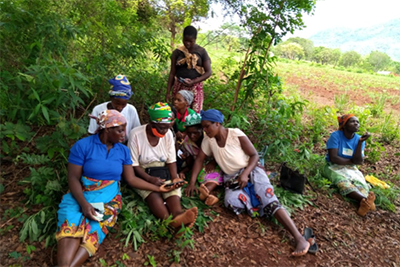 2017-2019 – Manica, Sofala, Zambézia and Nampula
2017-2019 – Manica, Sofala, Zambézia and Nampula
We champion Information Communication Technology (ITC) tools for remote extension
Because less than 5 percent of farmers receive technical assistance in the provinces where we work, Information Communication Technology (ICT) tools have become a critical way of reaching large volumes of farmers, many of whom would otherwise be excluded from traditional extension services. The COVID-19 pandemic has made these tools a necessity. Our MultiMedia Extension project, funded by USAID, the Bill and Melinda Gates Foundation and Dfid, tested the use of community radio, mobile phone communication channels and video for rural extension. Through the Vodacom- and VIAMO-managed 321 Platform, we disseminated SMS, IVR and USSD messages about good agricultural practices, commodity price information and information regarding goods and services to 69,000 smallholders. With Farm Radio International, we supported seven community radio stations to produce and air interactive, agriculture-based radio programs that reached 700,000 listeners. As a result, 365,000 farmers adopted at least one of the promoted technologies, corresponding to around 485,000 hectares of land under cultivation with improved techniques.
We continued the use of ICT tools for agriculture though our partnership with Future Water, an organization that specializes in the use of drones. The use of drones allows us to monitor crop production, evaluate our activities and detect crop stress three weeks earlier than a farmer on the ground. As a result, they have become an integral part of the PROMAC project monitoring toolkit.
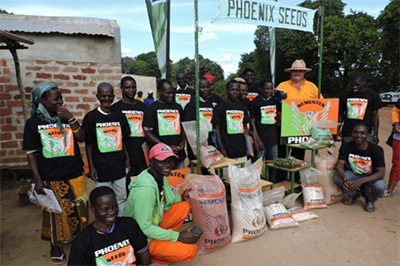 2015-present – Manica, Sofala, Zambézia and Nampula
2015-present – Manica, Sofala, Zambézia and Nampula
We promote inclusive business approaches that promote access to inputs markets
Our USAID Partnering for Innovation-funded SEEDS project (2015-2017) laid the foundations for a 280+ strong network of last-mile entrepreneurs selling certified seeds and inputs in their communities. This cadre of entrepreneurs forms the backbone of most of NCBA CLUSA’s current work in Mozambique and is a perfect example of how agribusinesses can successfully engage rural SMEs and smallholders in their business models, generating mutual incentives while at the same time improving farmers’ access to quality goods and services. Through SEEDS, NCBA CLUSA supported 283 last-mile entrepreneurs to sell 132 tons of full-price certified seeds to more than 20,000 smallholder farmers in their communities during the 2015/7 and 2016/7 campaigns, disproving the notion that seeds and inputs must be subsidized for farmers to use them and suggesting, instead, that access is the greatest challenge to the uptake of improved seeds.
In 2020 the SEEDS+ project, also funded by USAID Partnering for Innovation, took this one step further by increasing farmers’ resilience to climate shocks and decreasing the risk of deepening their investments in production by promoting weather index insurance as a risk transfer mechanism. Individually, it is difficult and sometimes impossible to extend insurance to smallholders, yet at the meso level—with a farmer who “bundles” insurance together with other products and services—insurance becomes viable. Our strong and ongoing partnership with Phoenix Seeds provided just this opportunity. Together with Hollard Seguros, Phoenix is the first seed company in Mozambique to automatically include weather index insurance in all of its product as standard, at no extra cost to the consumer. This was made possible by pioneering the use of a two-way SMS platform for digital insurance registration that issues claims and weather alerts. Through our one-year pilot, Phoenix Seeds sold 805 tons of insured seeds to 27,000 smallholder beneficiaries, proving that it is technically and financially viable to market insurance to smallholders via purely commercial channels, and demonstrating to Phoenix the clear value proposition in continuing to blaze a trail in smallholder insurance by including insurance in its product, as standard, for the 2021 season and beyond.
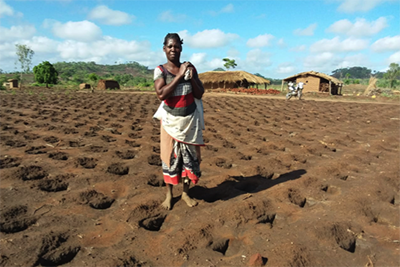 2012-present – Manica and Zambézia, and previously Tete
2012-present – Manica and Zambézia, and previously Tete
We develop farmers’ resilience to climate change through Climate Smart Agriculture
The Climate Smart Agriculture Program for Smallholder and Emerging Farmers in Mozambique (PROMAC I and PROMAC II) project aims to increase food security and farmer incomes for 31,500 smallholders in Manica and Zambézia provinces through the adoption of Climate Smart Agriculture (CSA) practices through a Lead Farmer Extension System involving 900 Lead Farmer-managed demonstration plots. PROMAC has four pillars: conservation agriculture, improved nutrition, functional adult literacy and land tenure, combined with increased farmer engagement in off-take and inputs markets (including an inputs discount program known as the Green Discounts). With support from our Agribusiness Unit, PROMAC stimulates the entire market system in which smallholders operate. Since 2012 PROMAC-supported farmers have sold 5,000 tons of commodities (worth USD$1,139,426). In 2020 alone, PROMAC supported last-mile entrepreneurs to sell 279 tons of inputs in their communities. 3,000 families have received DUATS and more than 5,200 adults have graduated from functional adult literacy classes. PROMAC beneficiaries have seen average yields increase by 116 percent and net income increase by 240 percent when compared to traditional agriculture practices.
2017-present – Manica, Zambézia and Nampula
We promote access to off-take and inputs markets through the AgriBusiness Unit
The Agribusiness Unit (ABU) is NCBA CLUSA’s umbrella entity linking all our smallholder and SME beneficiaries with the private sector. Primarily responsible for promoting inclusive business models, the ABU supports rural SMEs to establish themselves as last-mile entrepreneurs; collects weekly prince and market information during the sales period and shares this with smallholders via community radio, WhatsApp and SMS; links smallholders and SMEs to inputs and off-take markets; and promotes inclusive finance mechanisms such as outgrower schemes, pre finance and formal credit. The ABU also produces an annual survey of financial products for the agricultural sector (shared with our partners and stakeholders) and works with research institutions to conduct studies and research that further our own work and that of others—such as the 2021 Intermediary Study, produced in partnership with the University of Eduardo Mondlane and Boston College Carroll School of Business.
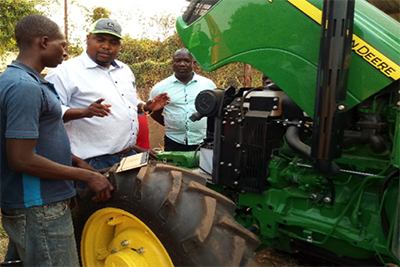 2017 – Manica
2017 – Manica
We design and deliver technical, vocational education and training for the agricultural sector
The Technical Vocational Education and Training (TVET) for Agriculture project, a partnership with the Bandula Technology Transfer Center, provides short, technical and skills-specific courses to the agricultural sector—specifically agribusinesses in Manica province that, due to the lack of trained Mozambican staff, have until now been forced to recruit staff from nearby Zimbabwe. TVET established the Manica Agribusiness Centre (MAC) that has since trained 690 people in courses that are designed and delivered in partnership with private sector partners including Lonagro Mozambique (John Deere representatives that head up tractor operator training), Yara Fertilizers (crop nutrition training), A.A.U (Global Gap and SMETA certification) and Phoenix Seeds (seed production and certification). Uniquely in Mozambique, courses are all short (under a week), permitting employers to release their staff for trainings. Students put their learning into practice on the CAM’s 20-hectare model farm—a practical classroom and demonstration space for private sector partners that also provides a space for the CAM’s AgriBusiness Youth Incubator Program. This program provides ambitious students with the land and startup funds to kickstart their own production plans, supported every step of the way by the CAM’s team of experienced agronomists and farm manager.
2020-2024 – Sofala
We increase resilience to climate shocks through a nexus approach
Using a nexus approach that integrates the food security, water and energy sectors, the Austrian Development Corporation-funded Climate Smart Agriculture and Water Sofala (CSAW Sofala) is supporting smallholders in Caia, Buzi and Machanga districts of Sofala province to increase their resilience to future climate shocks after Cyclone Idai hit the province in early 2019. CSAW Sofala, which is implemented in partnership with district government through its District Services for Economic Development (SDAE) and District Services for Planning and Infrastructure (SDPI), will reach 7,800 smallholders (50 of whom are women), focusing first on basic water, sanitation and hygiene provision and promoting conservation agriculture techniques as farmers recuperate their livelihoods post-cyclone. Later, CSAW Sofala will begin promoting more market-orientated production (such as horticultural production using solar pumps) and other forms of rural commerce (e.g. input sales and commodity aggregation).

